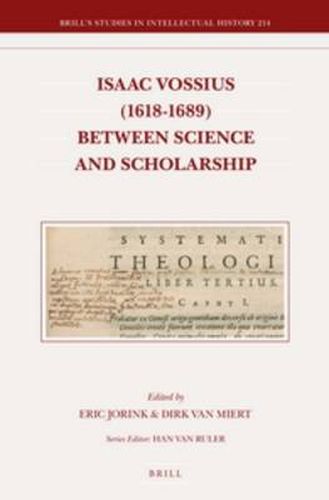Readings Newsletter
Become a Readings Member to make your shopping experience even easier.
Sign in or sign up for free!
You’re not far away from qualifying for FREE standard shipping within Australia
You’ve qualified for FREE standard shipping within Australia
The cart is loading…






Mostly remembered for his library and for his biblical criticism, Isaac Vossius (1618-1689) played a central role in the early modern European world of learning. Taking his cue from the unlikely bedfellows Joseph Scaliger and Rene Descartes, Vossius published on chronology, biblical criticism, optics, African geography and Chinese civilization, while collecting, annotating and selling one of the century’s most precious libraries. He was appointed an early Fellow of the Royal Society, and moved in the circles which later gave rise to the Academie Royale des Sciences. Together with Christiaan Huygens, he was considered the Dutch Republic’s foremost student of nature.
In this volume, a range of authors analyse Vossius’ participation in the full spectrum of the Republic of Letters, much of which has sadly been written out of the history of both scholarship and science.
Contributors include: Anthony Grafton, Scott Mandelbrote, Fokko Jan Dijksterhuis, Karel Davids, Thijs Weststeijn, Colette Nativel, Susan Derksen and Astrid C. Balsem
$9.00 standard shipping within Australia
FREE standard shipping within Australia for orders over $100.00
Express & International shipping calculated at checkout
Mostly remembered for his library and for his biblical criticism, Isaac Vossius (1618-1689) played a central role in the early modern European world of learning. Taking his cue from the unlikely bedfellows Joseph Scaliger and Rene Descartes, Vossius published on chronology, biblical criticism, optics, African geography and Chinese civilization, while collecting, annotating and selling one of the century’s most precious libraries. He was appointed an early Fellow of the Royal Society, and moved in the circles which later gave rise to the Academie Royale des Sciences. Together with Christiaan Huygens, he was considered the Dutch Republic’s foremost student of nature.
In this volume, a range of authors analyse Vossius’ participation in the full spectrum of the Republic of Letters, much of which has sadly been written out of the history of both scholarship and science.
Contributors include: Anthony Grafton, Scott Mandelbrote, Fokko Jan Dijksterhuis, Karel Davids, Thijs Weststeijn, Colette Nativel, Susan Derksen and Astrid C. Balsem